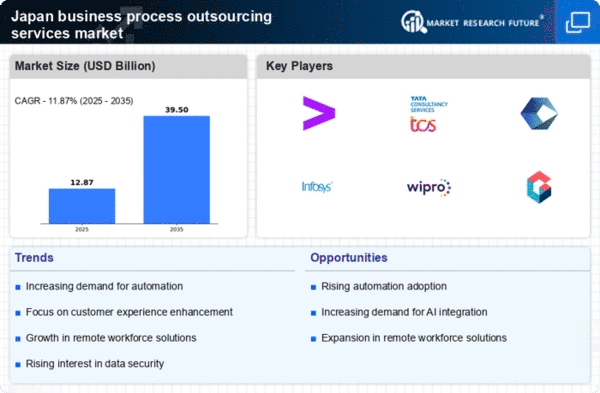Rising Demand for Cost Efficiency
The business process-outsourcing-services market in Japan is experiencing a notable surge in demand for cost efficiency. Companies are increasingly seeking to reduce operational costs while maintaining service quality. This trend is driven by the need to remain competitive in a rapidly evolving market. As a result, businesses are outsourcing non-core functions to specialized service providers, which can offer lower costs due to economies of scale. Recent data indicates that organizations that leverage outsourcing can achieve cost reductions of up to 30%. This shift not only enhances profitability but also allows firms to allocate resources more effectively, thereby fostering innovation and growth within their core operations.
Enhanced Focus on Customer Experience
The business process-outsourcing-services market is increasingly driven by an enhanced focus on customer experience. Japanese companies are prioritizing customer satisfaction as a key differentiator in a competitive landscape. Outsourcing customer service functions allows organizations to leverage specialized providers that excel in delivering exceptional customer interactions. This trend is supported by research indicating that companies investing in customer experience see a 20% increase in customer retention rates. By outsourcing these functions, businesses can ensure that they meet evolving customer expectations while concentrating on their core competencies, ultimately leading to improved brand loyalty and market share.
Growing Need for Specialized Expertise
The business process-outsourcing-services market is witnessing a growing need for specialized expertise. As industries become more complex, companies are turning to outsourcing providers that possess niche skills and knowledge. This trend is particularly pronounced in sectors such as finance, healthcare, and IT, where regulatory requirements and technological advancements necessitate specialized capabilities. By outsourcing to experts, organizations can ensure compliance and enhance service quality. Recent statistics indicate that firms utilizing specialized outsourcing services report a 25% improvement in operational efficiency. This shift underscores the importance of expertise in driving business success in an increasingly competitive landscape.
Emphasis on Scalability and Flexibility
Scalability and flexibility are becoming critical factors in the business process-outsourcing-services market. Japanese companies are increasingly recognizing the need to adapt to fluctuating market demands. Outsourcing provides the agility required to scale operations up or down without the burden of fixed costs associated with in-house functions. This adaptability is particularly valuable in industries characterized by seasonal variations or rapid growth. Data suggests that businesses leveraging flexible outsourcing arrangements can respond to market changes 40% faster than those relying solely on internal resources. This capability not only enhances operational resilience but also positions companies to seize emerging opportunities.
Increased Focus on Digital Transformation
Digital transformation is a pivotal driver in the business process-outsourcing-services market. Japanese companies are increasingly adopting advanced technologies such as artificial intelligence, machine learning, and automation to enhance operational efficiency. This trend is evident as organizations seek to streamline processes and improve customer experiences. The integration of digital tools into outsourcing services is expected to grow, with projections suggesting that the market for digital outsourcing solutions could reach ¥1 trillion by 2026. This transformation not only optimizes workflows but also enables businesses to respond swiftly to market changes, thereby enhancing their competitive edge.

















